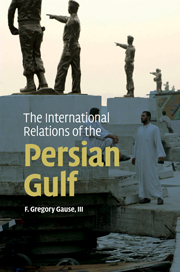Book contents
- Frontmatter
- Contents
- List of maps and tables
- Acknowledgments
- Note on the text and bibliography
- 1 The Persian Gulf as a security region
- 2 The emergence of the Gulf regional system, 1971–1978
- 3 The Iranian Revolution and the Iran–Iraq War
- 4 The Gulf War and the 1990s
- 5 9/11, the Iraq War and the future of the Persian Gulf
- 6 The Iraq War: American decision-making
- 7 Conclusions: war and alliance in the Persian Gulf
- Index
- References
1 - The Persian Gulf as a security region
Published online by Cambridge University Press: 05 June 2014
- Frontmatter
- Contents
- List of maps and tables
- Acknowledgments
- Note on the text and bibliography
- 1 The Persian Gulf as a security region
- 2 The emergence of the Gulf regional system, 1971–1978
- 3 The Iranian Revolution and the Iran–Iraq War
- 4 The Gulf War and the 1990s
- 5 9/11, the Iraq War and the future of the Persian Gulf
- 6 The Iraq War: American decision-making
- 7 Conclusions: war and alliance in the Persian Gulf
- Index
- References
Summary
This book will tell the story of the international politics of the Persian Gulf region, the site of three large-scale international wars since 1980: the Iran–Iraq War of 1980–88, the Gulf War of 1990–91 and the Iraq War, which began with the American invasion of 2003 and continues to today. The year 1971 is the starting point for the study because it marks an important turning point in the region's history. Bahrain, Qatar, the United Arab Emirates (UAE) and Oman become independent in that year, ending decades as British protectorates. Kuwait, the other small monarchical state in the area, gained its independence from London in 1961. With the end of formal British protection of these smaller states, the larger regional powers – Iran, Iraq and Saudi Arabia – could contest for regional influence in a much less constrained environment. With the oil revolution of the early 1970s underway, these three states had much greater resources to commit to their contest for influence. The narrative ends in 2008, but not because the story is over.
A number of themes will tie together this narrative of Gulf international politics. The wars themselves are central to the story, to be sure. I will try to convince you that Saddam Hussein's war decisions in 1980 and 1990 (and even his behavior in the lead-up to the 2003 war) and the alliance decisions of regional powers are best explained by leaders' concerns about their own hold on power domestically, and how regional events and regional rivals could affect their own security at home.
- Type
- Chapter
- Information
- The International Relations of the Persian Gulf , pp. 1 - 15Publisher: Cambridge University PressPrint publication year: 2009

